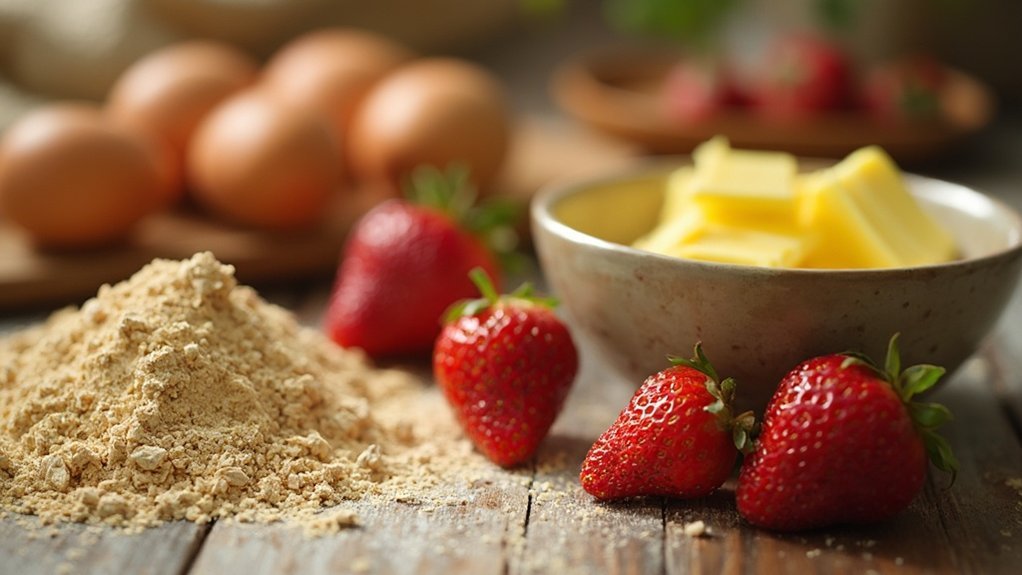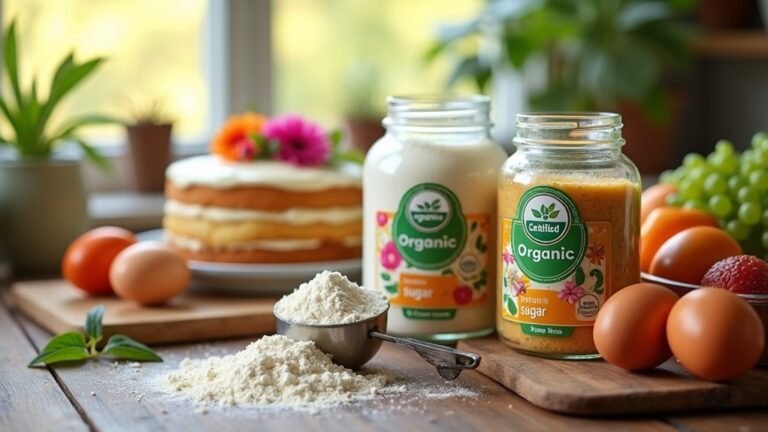Why Organic Ingredients Matter in Baked Goods
Organic ingredients in baked goods are important as they provide better health benefits and flavour. They reduce exposure to harmful pesticides and fertilisers, while delivering more nutrients and enhanced taste. Choosing organic can encourage healthier eating habits and decrease the risk of chronic diseases. Furthermore, organic farming benefits the environment by boosting biodiversity and improving carbon storage. If you're keen to learn more about how organic ingredients are transforming the baking industry, keep an eye on the latest trends and innovations.
Key Takeaways
- Organic ingredients limit exposure to harmful synthetic pesticides and fertilisers, making baked goods healthier.
- They enhance nutrient retention and natural flavours, improving the overall quality of baked products.
- Choosing organic options encourages healthier eating habits, which can aid in managing blood sugar and supporting gut health.
- Organic farming practices help reduce greenhouse gas emissions and promote biodiversity, benefiting the environment.
- The growing demand for organic bakery items shows consumers are prioritising food safety, quality, and clean label products.
Health Benefits of Organic Ingredients
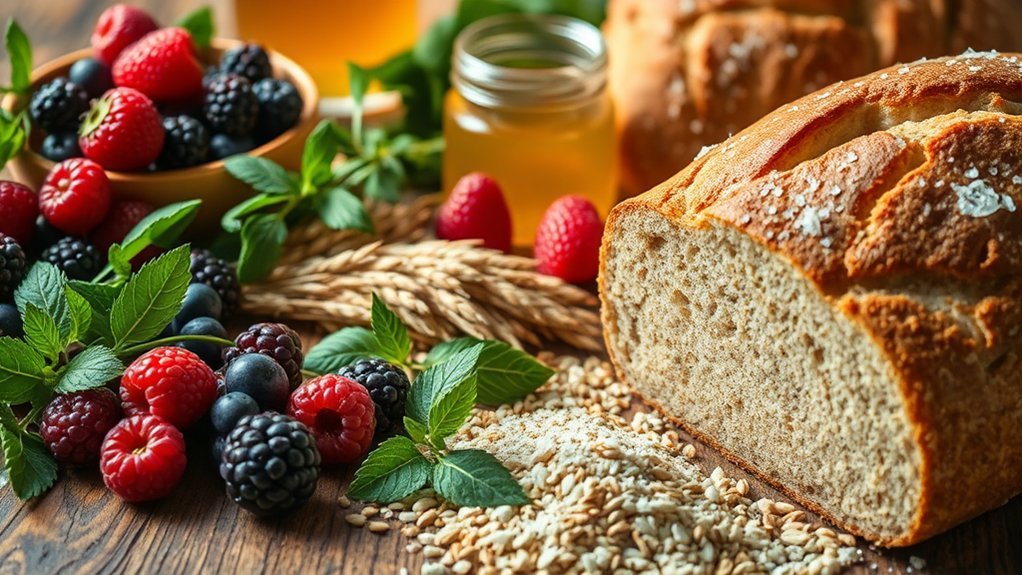
Choosing organic ingredients for your baked goods isn't just about a different taste; it's a commitment to your health. Organic foods come with the benefit of reduced exposure to synthetic pesticides and fertilizers. They often retain more nutrients and natural flavours, which can enhance the quality of your bakes. This emphasis on sustainable farming practices ensures that the ingredients not only benefit your health but also support the environment.
By opting for whole, minimally processed organic options, such as wholemeal flour, you increase the fibre, vitamins, and minerals in your recipes. Using organic ingredients can also encourage healthier eating habits, helping to manage blood sugar levels and promote gut health. The organic baking industry is experiencing steady growth driven by consumer demand, reflecting a shift towards prioritizing health and wellness in food choices.
In the long run, incorporating organic ingredients into your baking can lead to a cleaner lifestyle and may lower the risk of chronic diseases. So, not only are your bakes delicious, but they can also be good for you.
Environmental Impact of Organic Farming
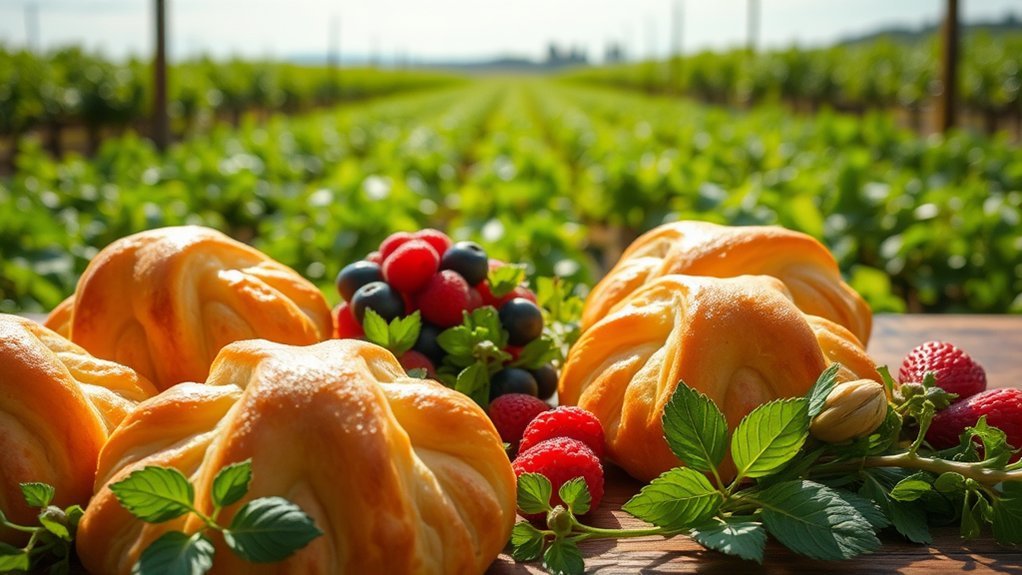
As you delve into organic farming, you'll notice its significant environmental impact, which goes beyond food production.
Organic methods utilise sustainable practices that notably lower greenhouse gas emissions by reducing the use of synthetic fertilisers. This not only fosters healthier soils but also enhances carbon storage and overall ecosystem vitality. Additionally, organic farming practices contribute to lower emissions compared to non-organic methods, as they often involve local sourcing that minimizes transportation-related carbon footprints.
By steering clear of synthetic pesticides, organic farming safeguards beneficial organisms, resulting in a 30% boost in biodiversity.
Moreover, organic soils have improved water retention, which is crucial during drought conditions.
By prioritising local resources, organic farming conserves soil and water while bolstering local economies.
Ultimately, these practices cultivate a more resilient environment, promoting ecological balance and a sustainable future for food production.
Market Demand and Trends in Organic Baking
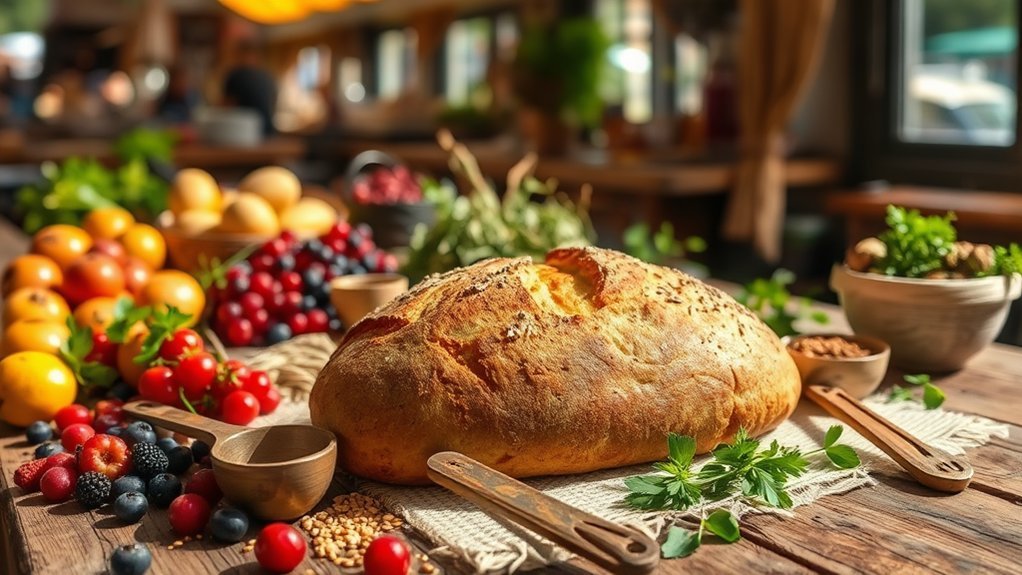
The increasing awareness of health and sustainability among consumers has sparked significant growth in the organic baking market. In 2024, the value of organic bakery products reached £12.14 billion and is expected to rise to £12.75 billion in 2025, highlighting a shift in consumer preferences. With a projected CAGR of 5.0% for 2025, this trend shows no signs of slowing. By 2031, the global market is projected to reach £126.47 billion, driven by a demand for clean label products and organic ingredients. The organic bakery market's growth suggests that cafes must adapt to meet evolving consumer expectations. With rising disposable incomes and a growing interest in healthier options like gluten-free and plant-based alternatives, this trend shows no signs of slowing. Consumers are increasingly prioritising food safety and quality, which will shape the future of the organic baking sector.
Innovations in Organic Baking
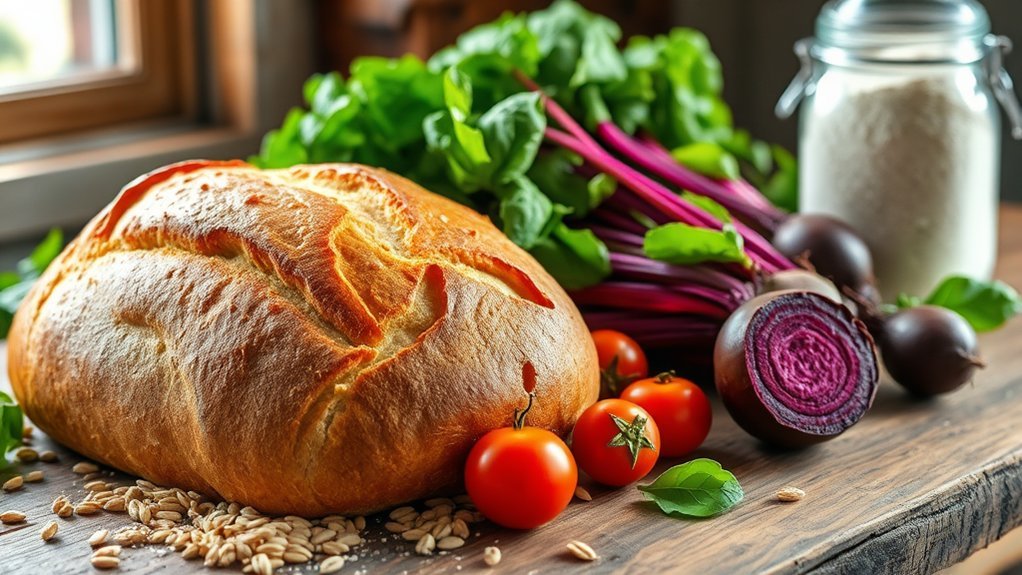
In the world of organic baking, innovations such as gluten-free mixes and alternative protein sources are changing the way we make and enjoy baked goods.
Using ancient grains not only boosts nutritional value but also links us to traditional baking methods.
These developments present exciting opportunities for both health-conscious consumers and professional bakers in the UK.
Gluten-Free Baking Mixes
Gluten-free baking mixes have seen impressive innovations, especially with the inclusion of organic ingredients. These developments not only improve gluten-free texture but also focus on health and sustainability. By incorporating organic flours and natural binders like guar gum and psyllium husk, you enhance flavour and retain nutrients.
| Benefits | Organic Ingredients | Innovations |
|---|---|---|
| Reduced Chemical Exposure | Minimises synthetic pesticides | Alternative flours like quinoa |
| Improved Flavour Profile | Richer, more vibrant tastes | Starch combinations for elasticity |
| Allergen-Free Assurance | Safe for sensitive diets | Pre-fermentation techniques |
This thoughtful mix of ingredients ensures you can enjoy tasty, wholesome baked goods without sacrificing health or flavour.
Alternative Protein Sources
As consumers increasingly look for healthier choices, alternative protein sources are transforming organic baking. Ingredients like hemp seed protein offer all essential amino acids and enhance dough elasticity, while soy products provide versatile protein options.
Legumes and pulses are rich in fibre and B vitamins, serving as substantial plant-based protein sources. Nuts and seeds not only add protein but also improve flavour and texture.
Grains such as quinoa and sprouted grains introduce innovative protein blends into your baked goods, ensuring a nutritious profile. By incorporating these alternative protein sources, you can create healthier and tastier options that cater to various dietary needs, helping your baking stand out in a competitive market.
Ancient Grain Incorporation
Incorporating ancient grains into organic baking can significantly enhance your baked goods. These grains not only improve flavour but also offer notable nutritional benefits. With the right techniques, you can easily adapt your recipes to include these grains.
- Grains like spelt and Kamut add unique textures and flavours to your products.
- It's important to adjust hydration levels and fermentation times for the best results.
- Educating consumers about gluten content is crucial for informed choices.
By swapping conventional flour for ancient grains, you can achieve their distinct earthy or nutty flavours while boosting health benefits.
Adopting these methods ensures your baked goods stand out, catering to the increasing demand for organic options.
Cost and Pricing Strategies for Organic Products
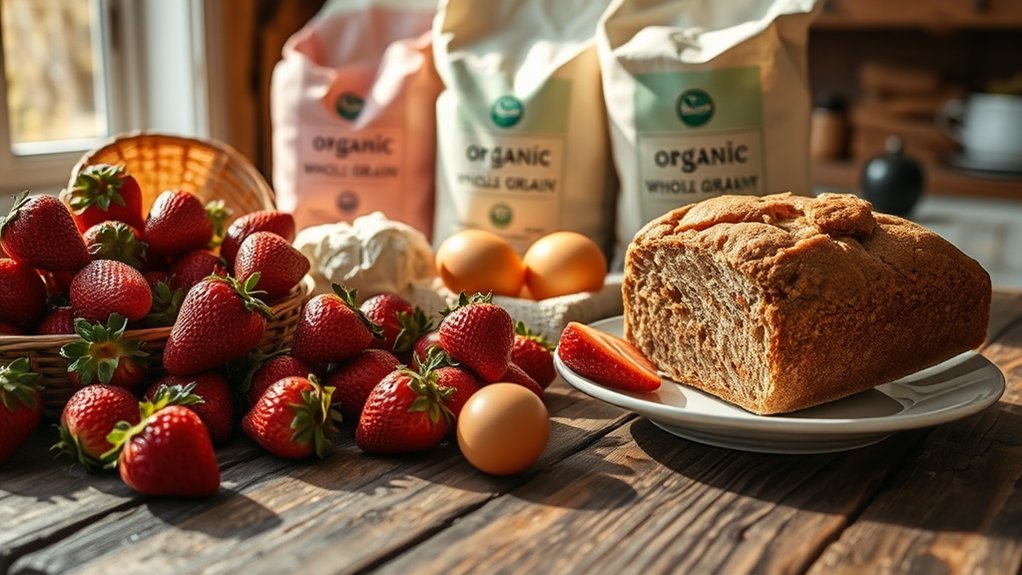
When pricing organic baked goods, it's important to factor in the higher costs of premium, certified organic ingredients.
To justify these prices, clearly communicate the value and quality of your products, as many consumers equate higher prices with better standards. For example, highlighting the benefits of organic flour or free-range eggs can resonate with health-conscious buyers.
Additionally, building a strong brand identity around your organic values can significantly improve your market position and attract more customers.
Ingredient Cost Considerations
Navigating the costs of organic ingredients is crucial for any bakery aiming to succeed in a competitive market. Your strategy for sourcing ingredients and managing supplier relationships significantly influences these costs.
Here are some key considerations:
- Availability: Organic ingredients can often be in short supply, which may limit your options and affect pricing.
- Negotiation: Developing strong relationships with suppliers can lead to better pricing, helping to offset the higher costs of organic ingredients.
- Certification: Don't forget to account for the expenses associated with obtaining organic certification as part of your overall costs.
Keeping these factors in mind can help your bakery remain competitive while using quality ingredients.
Premium Pricing Justification
Premium pricing for organic baked goods is often justified by the higher costs of sourcing quality ingredients, which directly impacts your profit margins. This approach can elevate your brand perception, positioning your products as superior. It's crucial to understand how different pricing models can be effectively applied.
| Pricing Strategy | Description | Ideal For |
|---|---|---|
| Cost-Plus Pricing | A markup added to total costs to ensure stable profits | High-volume items |
| Competitive Pricing | Setting prices in line with competitors | Attracting customers |
| Value-Based Pricing | Prices based on the perceived value of organic ingredients | Premium organic products |
For instance, if you use high-quality, locally sourced flour, it justifies a higher price point compared to standard baked goods. This not only enhances your product's appeal but also aligns with consumer preferences for quality and sustainability.
Brand Identity Importance
Establishing a strong brand identity is crucial for organic bakeries, as it shapes customer perception and builds loyalty. Effective branding includes elements like logo and packaging design, creating a consistent image that resonates with consumers.
- Brand storytelling: Sharing your sourcing journey helps build trust and connection with customers.
- Eco-friendly packaging: Custom designs not only improve aesthetics but also highlight your commitment to sustainability.
- Consistent visual identity: Using earthy colours and appropriate typography reflects your organic values.
By implementing these strategies, you can justify premium pricing and enhance customer loyalty.
Emphasising what makes your brand unique sets you apart in a competitive market, fostering a community of health-conscious consumers who value quality and sustainability.
Marketing and Branding Strategies for Organic Bakeries

As consumers in the UK increasingly value health and sustainability, organic bakeries need effective marketing and branding strategies to differentiate themselves in a crowded market.
Focus on creating a strong brand identity that showcases your dedication to organic ingredients and eco-friendly practices. Use sustainable packaging to emphasise these values, and ensure clear labelling of your products to promote transparency.
Get involved in local community initiatives and events to boost brand visibility and support local farmers.
Social media campaigns and partnerships with influencers can also be powerful tools to engage your target audience. Encourage your customers to share their experiences, as user-generated content can build loyalty.
The Role of Consumer Awareness in Organic Choices

How much do you really know about the benefits of choosing organic products? Your knowledge significantly impacts the demand for these items. Consumer education is vital in clearing up misconceptions about organic products that may affect informed buying decisions.
- Organic products are generally free from GMOs.
- Understanding pesticide risks often leads to a preference for organic.
- Clean labels appeal to health-conscious shoppers.
As you learn more about organic ingredients, you may come to appreciate their health benefits and sustainability. Increased knowledge can boost your willingness to pay more for organic products, particularly in the bakery sector.
Future of Organic Ingredients in the Baking Industry
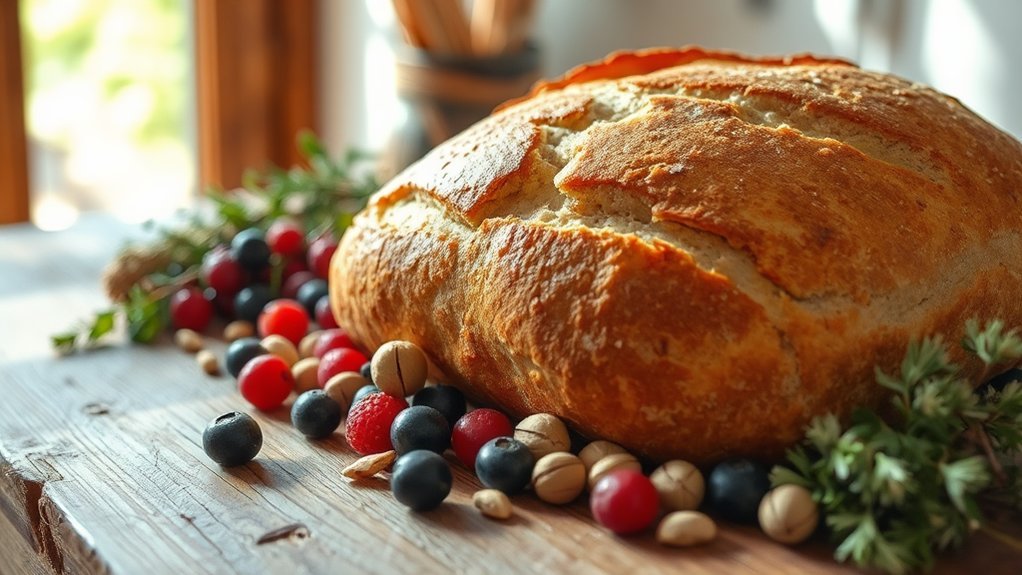
The organic bakery market is set for considerable growth, driven by changing consumer preferences and technological advancements. This shift brings both opportunities and challenges for businesses.
Consumers are increasingly looking for clean-label products and sustainable sourcing, demanding greater transparency in their food choices. Innovations such as enzyme-based solutions and premium gluten-free flours improve both product consistency and nutritional value.
As urbanisation and changing lifestyles heighten the demand for healthier options, businesses must adapt their offerings.
Collaborating with local farmers and prioritising eco-friendly packaging will be crucial in meeting consumer expectations. By embracing these trends, you can position your bakery to succeed in the expanding organic sector.
Frequently Asked Questions
How Do Organic Ingredients Affect Baked Goods' Taste and Texture?
Organic ingredients elevate baked goods by enhancing their flavour and texture. For instance, using organic flour can result in a nuttier taste, while organic butter often lends a creamier texture. You'll find that these ingredients provide a more consistent quality, leading to a delightful sensory experience in every bite.
Are All Organic Baked Goods Gluten-Free?
Not all organic baked goods are gluten-free. If you're sensitive to gluten, it's essential to check the ingredients carefully. Some organic products may still contain gluten, even though they have organic certification, which doesn't guarantee they're gluten-free. For example, wholemeal bread made with organic flour may still pose a risk for those with gluten intolerance. Always read labels to be sure.
Can I Find Organic Ingredients Locally?
Can you find organic ingredients locally? Definitely! Many supermarkets and organic shops stock products from local farmers, making it simple for you to access fresh, high-quality organic ingredients right in your community. For instance, farmers' markets are a great place to discover seasonal organic produce.
How Long Do Organic Baked Goods Last Compared to Non-Organic?
Organic baked goods generally have a shorter shelf life than their non-organic counterparts. This is mainly due to the higher quality ingredients used and the absence of preservatives. For instance, an organic loaf of bread might only last a few days, while a non-organic one could stay fresh for over a week. So, if you opt for organic, be prepared to enjoy them quickly to savour their natural flavours.
What Certifications Should I Look for in Organic Baking Products?
Look for the Soil Association Organic logo to ensure compliance with organic standards; around 80% of consumers prefer certified products. This highlights sustainable farming practices and underscores the significance of organic certifications in your baking choices.
Conclusion
In conclusion, choosing organic ingredients for baked goods is more than just a passing fad; it signifies a genuine commitment to health, sustainability, and ethical standards. While some may argue that organic doesn't always mean better quality, studies indicate it often results in more nutrient-rich products. As consumers become more aware, the demand for organic options is set to influence the future of baking. By making these choices, you're not only improving your health but also contributing to a more sustainable food system.

